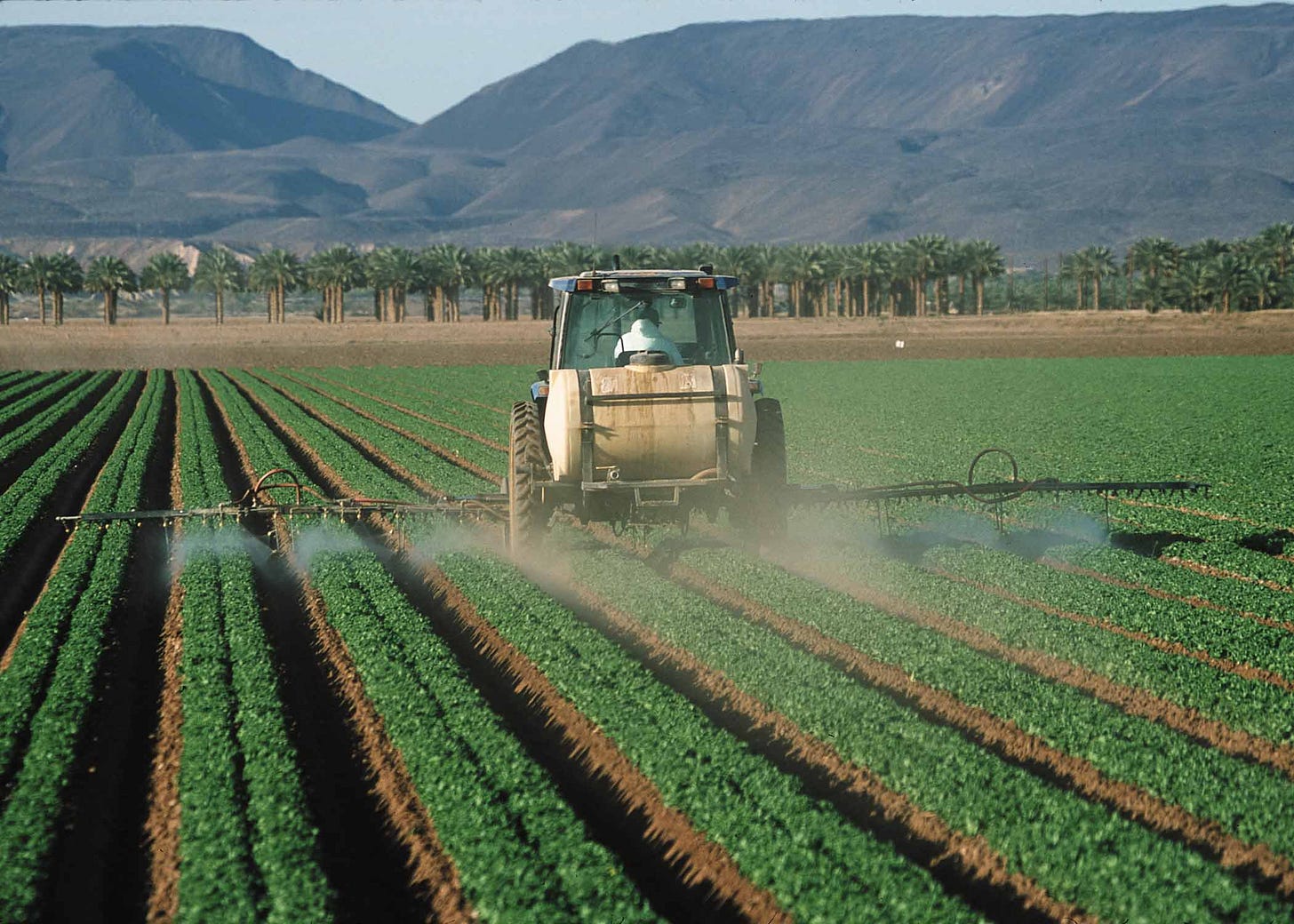News of the week
New report details how factory farming practices loads our environment with insecticides and herbicides
This year marks the 60th anniversary of the publication of Rachel Carson’s Silent Spring. Relying on some of the best science and using a plain yet elegant prose style, Carson shook the country out of its complacency and ignorance of the harmful effects of the pesticides used in our farming. The beginnings of the modern environmental movement are credited, at least in part, to Carson’s book, yet insecticides and herbicides have continued to be used and have in fact proliferated.
Animal World Protection and the Center for Biological Diversity have issued a report on pesticides. Pesticides are used for all sorts of agriculture. The production of potatoes, tomatoes, greens, and just about everything else that is not from an organic farm relies to some extent on pesticides, but the report calls out factory farming of meat production for driving an inordinate amount of pesticide use.
My grandparents had a farm, with chickens, hogs, and cows. When my family moved there when I was nine, my grandmother still kept a few head of cattle. They grazed in the fields, and we fed them hay in the wintertime. No pesticides were ever used, because there was never any need. For a lot of folks this idyllic image of cattle openly grazing in fields is how they think of where their hamburgers come from.
Factory farms
But factory farming is ugly, with cattle confined to feeding lots and fed on corn and soy—foods, it might be noted, that are not part of their natural diet and that present difficulties for the cows’ digestion and health. Though thunderously inefficient in real terms, it is an economically viable way of producing meat because of subsidies from governments.
About half of all habitable land in the world is used for agriculture, and of that, about one third is used to grow soy and corn for factory farming. Of all the corn we grow, from one third to almost half of it is used to feed cattle. Worldwide, only about 19 percent of soy beans wind up as food for humans, while 77 percent is used for animal feed. About four percent is put to industrial purposes.
And the magnitude of our agriculture system continues to grow. The number of hogs raised across the globe as livestock more than doubled from 1960 to 2020. In the same time the number of sheep and goats and cows have steadily risen. The number of chickens has exploded five-fold, from around five billion in 1960 to over 25 billion in 2020.
In the United States—in just one year, 2018 to 2019—about 2.6 million acres of grasslands were converted to row crop agriculture. Almost 70 percent given over to corn (25%), soy (22%), and wheat (21%).
Factory farms use lots of pesticides
In 2018, the most recent year for which full data is available, almost 250 million pounds of herbicide and insecticide were used on U. S. corn and soybean crops that were used to feed factory raised cattle. That comes out to close to three quarters of a pound of pesticide per person in the United States.
Pesticides contaminate surface and groundwater. Between 2013 and 2017, the U.S.Geological Survey performed year-round testing on water from 72 sites across the country in mixed use, agricultural, and developed watersheds. Of the roughly one thousand samples collected, 88 percent were contaminated with five or more pesticides. One sample contained 60 different pesticides.

The pesticides hurt the adjacent wildlife. A review of almost 400 studies found that beneficial ground-dwelling invertebrates—ants, earthworms, beetles, and ground-nesting bees—were harmed by pesticides, all the while only 0.1 percent of pesticides directly reach their targeted pests. And it is not just the small critters that are harmed. The report cites work by the U.S. Fish and Wildlife Service that estimates that 72 million birds are killed every year in the United States because of pesticides.
Recommendations
Among the recommendations made, the organizations want to see governments end all campaigns promoting meat and dairy and an end to bailouts for Big Meat. They want to see these companies required to disclose the biodiversity risks that they pose. They suggest that governments adopt more sustainable dietary guidelines for their citizens. Long-term, they recommend that governments aid farmers to transition from raising animals to raising crops.
For individuals they say that we can cut down on our meat consumption, encourage our grocery stores to carry more meat alternatives, and mention to waiters and restaurant managers that we’d like to see more vegetarian and vegan options on menus. They recommend that we urge our elected officials to repeal legislation that props up the meat industry and to pass legislation that requires more prudent use of pesticides.
For more environmental news and science follow me on Twitter @EcoScripsit.





I'm not a vegetarian or vegan, but I have been trying to eat less meat, both smaller amounts and less often. This is a good reminder of why I need to focus on this, thank you.